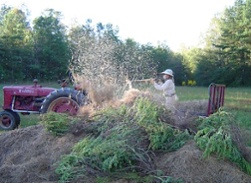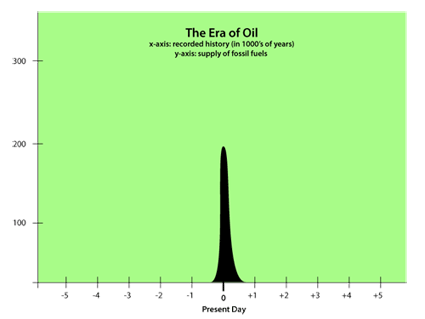The Optimism of Pessimism in the Age of Peak Oil

 Five years ago I read a book that freaked the hell out of me – The Long Emergency by Jim Kunstler. I was drinking a lot of peak oil kool-aid that year, but that book really got to me in a way that the others didn’t. I had to re-evaluate everything I thought about how the future might unfold, and it scared the crap out of me. It took months before I started to feel ‘normal’ again.
Five years ago I read a book that freaked the hell out of me – The Long Emergency by Jim Kunstler. I was drinking a lot of peak oil kool-aid that year, but that book really got to me in a way that the others didn’t. I had to re-evaluate everything I thought about how the future might unfold, and it scared the crap out of me. It took months before I started to feel ‘normal’ again.
Five years ago I read a book that freaked the hell out of me – The Long Emergency by Jim Kunstler. I was drinking a lot of peak oil kool-aid that year, but that book really got to me in a way that the others didn’t. I had to re-evaluate everything I thought about how the future might unfold, and it scared the crap out of me. It took months before I started to feel ‘normal’ again.
This happened in 2005-06, at the height of the ‘irrational exuberance’ (to use Alan Greenspan’s term) of the real estate boom. After reading that book, everywhere I looked, I saw an economy hell-bent on creating and servicing suburbia, and it all looked like a house of cards. I feared that the slightest breeze was going to bring it down, and I wondered if I’d survive the social and economic chaos to follow the collapse.
I envisioned hordes of people pouring out of Atlanta and over-running the little farm I lived on at the time. My worst post-apocalyptic nightmares were about to come true. Did I have enough time to assemble a band of like-minded souls to come and farm with me and ward off intruders? Would I have to kill someone to survive? Oh, man, the end of the world is nerve-wracking.
enough time to assemble a band of like-minded souls to come and farm with me and ward off intruders? Would I have to kill someone to survive? Oh, man, the end of the world is nerve-wracking.
The good news is that that economic breeze came in 2008, and although our house of cards swayed, it hasn’t all fallen down. We’re still chugging along, albeit at a slower, more realistic pace, and the cards are getting reshuffled a bit. The structure is changing slowly but surely, too, as we rebuild the house.
I think the new construction industry may never be what it was just five years ago. We’re facing the end of growth, I believe, and seeing a little economic pessimism actually makes me optimistic that we can survive it. The alternative is overshoot, which some say we can’t avoid at this point.
I’m optimistic, though, because not only did we survive the economic downturn, but also we’re having to undergo a complete re-evaluation of how we do things.
I’m optimistic because the economic pessimism is bringing us back down to Earth. We’re having to learn how to live within our means, individually and collectively.
I’m optimistic because I believe that the work I do is critical to moving through this transition in human history as gracefully as possible.

This is a special post that’s part of the Let’s Blog Off phenomenon, which I found out about from Sean Lintow of SLS Construction. The theme for this week’s Blog Off is “Is there a reason to be optimistic?” You can see the topic page by clicking the previous link, or go directly to any of the posts by other participating bloggers by clicking the links below.
| Blogger | Blog Post Link | |
|---|---|---|
| Veronika Miller | @modenus | Modenus Community |
| Paul Anater | @paul_anater | Kitchen and Residential Design |
| Rufus Dogg | @dogwalkblog | DogWalkBlog.com |
| Becky Shankle | @ecomod | Eco-Modernism |
| Bob Borson | @bobborson | Life of an Architect |
| Bonnie Harris | @waxgirl333 | Wax Marketing |
| Nick Lovelady | @cupboards | Cupboards Kitchen and Bath |
| Tamara Dalton | @tammyjdalton | Tamara Dalton Design Studios |
| Sean Lintow, Sr. | @SLSconstruction | SLS-Construction.com |
| Cindy FrewenWuellner | @Urbanverse | Urbanverse’s Posterous |
| Steve Mouzon | @stevemouzon | Original Green |
| Madame Sunday | @ModernSauce | Modern Sauce |
| Saxon Henry | @saxonhenry | Roaming by Design |
| Brian Meeks | @ExtremelyAvg | Extremely Average |
| Denese Bottrell | @Denese_Bottrell | Thoughtful Content |
| Chamois Green | @chamwashere | Cham Was Here |
| Betsy De Maio | @egrgirl | Egrgirl’s Blog |
| Steve Kleber | @stevekleber | Marketing Home Products |
| Allison A. Bailes III | @EnergyVanguard | Energy Vanguard Blog |
| Ami | @beckami | Multifarious Miscellany |
Emergency Exit photo by lucianvenutian, at flickr.com
This Post Has 13 Comments
Comments are closed.

Thanks for joining in today
Thanks for joining in today and you’re the second person to invoke Jim Kunstler!
My suburbia is so anti
My suburbia is so anti business that there are no jobs less than 10 miles away from where you live, good jobs 15-20. When those industries dried up (GM, Mead, NCR) people had no viable choices that didn’t require a 1-2 hour commute to one of two larger cities for good jobs. Now homes are being foreclosed as unemployment dries up and more people have fewer transportation choices (no busses, no public anything…)
Crazy, stupid urban “planning” that wanted to keep everything neat and trimmed, but entirely unsustainable or livable.
I dont think its the end of
I dont think its the end of growth for another 40 years, I wonder what Kuntler said? we should see an extra few million in the US for many years, till 2040 or even 2050. Then pop stops, shrinks eventually, I agree there – I mean, barring some huge calamity.
For construction, some regions will shrink, others will expand, but all need to become more sustainable and to be ready for new uses. there’s a lot of work to be done. but… it will take fewer people and less products, so there’s surely differences in the way we build and hire.
Yr doing a huge service, here’s an excellent idea: “the work I do is critical to moving through this transition in human history as gracefully as possible.” Amen to that! so glad to read your thoughts.
cindy @urbanverse
You’re welcome, Paul. I’ve
You’re welcome, Paul. I’ve been eying the LetsBlogOff topics for a while now and just couldn’t resist this one, even though I didn’t really have time to write one and had already published an article earlier this morning. I wasn’t going to do it, but the article kind of wrote itself in my head during the day, so I poured it out a while ago.
Rufus, I certainly agree that
Rufus, I certainly agree that crazy and stupid are two of the best words to describe what has passed for planning in the suburbs. I like Kunstler’s statement that, “Suburbia is the greatest misallocation of resources in the history of the world.”
Cindy, you may well be right
Cindy, you may well be right about the timing of the end of growth. (As my wife told me recently, I need a new crystal ball, so I try not to be too specific about when things will happen.) I do believe that we’ll totter on for a while hoping to regain our lost economic momentum before we reach the end of growth. The key is that the economic downturn gives us a window of opportunity to ease ourselves into a new gestalt.
Allison,
Allison,
I’m not sure it’s pessimism as much as a sobering, rational taking of account of things, and how to adjust and bring forth a more stable, sustainable economy that’s not predicated on extreme consumption. I hope that I am ultimately able to play a role in bringing that about, along with you.
– John
Allison, I’m an optimist, but
Allison, I’m an optimist, but Kunstler is a friend of mine. I was very angry with him when he wrote The Long Emergency, in part because of my optimism. But if you go back and read it today, much of it reads like history… it was really prophetic about many things. I continue in my optimism, but with the realization that we’re at a very fluid time in history, when things could go in many directions.
John, you’re absolutely right
John, you’re absolutely right about the “sobering, rational taking of account of things,” but the attitude a person assumes given the data before them is where the pessimism comes in. And there are a lot of very pessimistic people right now – those who’ve been unemployed for a long time, those who’ve seen their economic status drop even if they still have a job, and those who are just scared about they see but don’t understand what’s behind it. That’s why those of us who can help with the transition have to do all we can.
Steve, fortunately there are
Steve, fortunately there are significant parts of The Long Emergency that don’t read like history (not yet anyway). It’s a bleak outlook on what we’re facing, and, I hope, close to a worst case scenario.
I’d known about peak oil for about 7 years already when I read the book and thought for a while that it meant we were in for inconvenience at worst. When I read Kunstler’s book, the full ramifications and potential calamity, combined with our economic fragility, started to sink in.
I’m glad that I was able to get past the shock I felt then. Now I try to focus my efforts on playing some small role in shaping our future in this ‘fluid time in history.’
Great post – I think this is
Great post – I think this is the only one of the letsblogoff contributions I’ve read where the writer related their own personal business to the larger problems of the national economy. (Don’t quote me on that, there were so many, I’ve started to forget their contents.) Excellent way to make the large and scary problems relate-able to the little people. And you are right that a little economic pessimism is just what we need to be realistic and show a better understanding – we can’t have such high expectations and NOT be let down.
Great post, Allison! One
Great post, Allison! One thing you wrote here that really resonated with me was how reading The Long Emergency affected you. Reading that book, and the World Made by Hand that followed left a cloud of anxiety and doom over my head for months. I think it affected me most as a father- imagining what kind of world my children and grandchildren would inherit.
I’ve since decided that Kuntzler is quite possibly the most pessimistic author I’ve read and I can only stand him in small doses. But his book forced readers to take a hard look at the reality of our situation. For me, it reaffirmed my intentions to be part of the solution. I think the work we do as raters and trainers is part of the solution, and the fact that we’re still in business doing that is a reason for optimism. For that matter, each day that you are still “upright and pumpin’ air” is reason for optimism.
Scott, it sounds like we’ve
Scott, it sounds like we’ve gone through the same process after reading The Long Emergency. It took me a while, too, but eventually I realized that Kunstler’s vision of the future was just one possibility, and a bleak one. Yes, we absolutely face some big problems, and it could be a tough century. We have a choice as to how we respond, though, and you and I have chosen to respond with optimism. Let’s hope more people educate themselves about these issues and join us in proving Kunstler wrong.